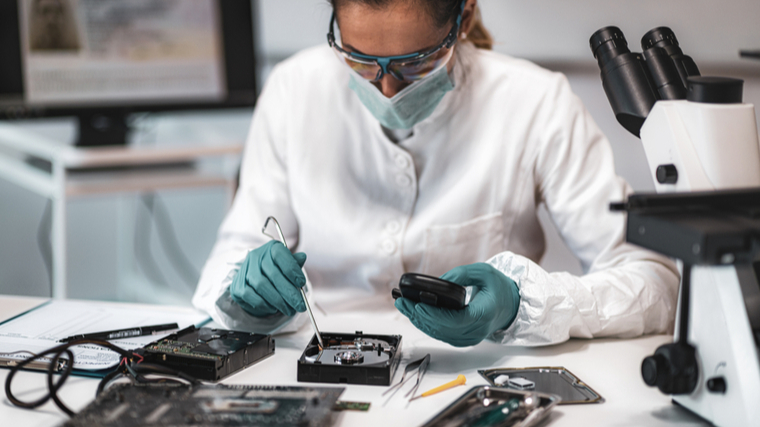| Rank | School | Location |
|---|---|---|
| 1 | University of Central Florida | Orlando, Florida |
| 2 | Champlain College | Burlington, Vermont |
| 3 | Utica College | Utica, New York |
| 4 | University of New Haven | West Haven, Connecticut |
| 5 | University of South Florida-Main Campus | Tampa, Florida |
| 6 | DeSales University | Center Valley, Pennsylvania |
| 7 | University of Maryland Global Campus | Adelphi, Maryland |
About This Ranking
This is a ranking of the best Digital Forensics Master's degrees online in the US.
This ranking is designed for online students to make informed college and degree decisions for getting an online master's in Digital Forensics. Our machine learning algorithm has developed this ranking using the criteria explained below.
These factors were selected as the most salient and important factors for students when considering an online master's degree in Digital Forensics. Students interested in pursuing an online master's in Digital Forensics would benefit from an undergraduate degree in Computer Science or Forensics or field related to these subjects.
What is Digital Forensics?
According to the International Criminal Police Organization (INTERPOL):
"Digital forensics is a branch of forensic science that focuses on identifying, acquiring, processing, analysing, and reporting on data stored electronically.
Electronic evidence is a component of almost all criminal activities and digital forensics support is crucial for law enforcement investigations.
Electronic evidence can be collected from a wide array of sources, such as computers, smartphones, remote storage, unmanned aerial systems, shipborne equipment, and more.
The main goal of digital forensics is to extract data from the electronic evidence, process it into actionable intelligence and present the findings for prosecution. All processes utilize sound forensic techniques to ensure the findings are admissible in court."
INTERPOL
What Do Digital Forensic Science Technicians Earn?
- Forensic Science Technicians earned $61,930 in 2021, according to the Bureau of Labor Statistics. The growth rate is projected to be 14%, adding an additional 2,400 positions by 2029.
- Cyber Forensic Analysts earn between $61,000 - $94,000 per year, according to Salary.com.

The Best Digital Forensics Master's Degrees Online
Ranking Methodology
This Best Digital Forensics Master's Degrees Online ranking was created using Successful Student's ranking algorithm. This algorithm uses the following data points to calculate a school's ranking placement:
- Retention rate
- Desirability (number of applicants)
- Percentage of students who are fully online
- In-district average tuition for full time graduates
- In-state average graduate tuition
- Academic influence
University of Central Florida
College of Engineering and Computer Science
Orlando, Florida
UCF Online provides a variety of online undergraduate, graduate and certificate programs.
The College of Engineering and Computer Science's online Master's in Digital Forensics degree program provides students skills in communication, computer technology, problem-solving, and more.
The program provides an in-depth understanding of computer crime and cybersecurity. The degree includes thesis and non-thesis options.
Required courses:
- Computer Forensics I
- Seizure and Examination of Computer Systems
- The Practice of Digital Forensics
- Topics in Forensic Science
- Computer Forensics II
The digital forensics online program represents a collaboration between various UCF Online departments and the National Center for Forensic Science.
Credit requirement: 30 credit hoursAdmissions and transfer credit information: Students must complete the online application and submit all previous official transcripts for evaluation. The admissions team also looks for official GRE or GMAT scores.
Accreditation: The University of Central Florida received accreditation from the Southern Association of Colleges and Schools Commission on Colleges.
Champlain College
Burlington, Vermont
The online Master's in Digital Forensic Science degree program prepares students to use digital evidence to investigate an array of crimes and develop methods to collect evidence for the courts.
The Department of Defense Cyber Crime Center has designated Champlain College as a National Center of Digital Forensics Academic Excellence.
Students in the degree program earn a specialized Digital Forensic Science graduate certificate before they complete the requirements for their master's degree.
The program includes a capstone research project.
Credit requirements: 30-33
Online courses:
- Digital Forensic Science
- The Practice of Digital Investigations
- Scripting for Digital Forensics
- Operating System Analysis
- Incident Response and Network Forensics
- Mobile Device Analysis
- Legal Principles of Digital Investigation
- Digital Investigation for Civil Litigation
- Capstone Research Thesis
Students also complete two of these online courses:
- Malware Analysis
- Digital Forensics & Encryption
- Computer Forensics Laboratory Operation & Management
Admissions and transfer credit information: The College prefers candidates who demonstrate a solid academic foundation. Champlain College recommends a minimum of 2.5, however the College may make exceptions on a case-by-case basis for candidates who demonstrate a potential for academic success in other ways.
Candidates must complete an online application which includes providing an essay. Candidates must provide official academic transcripts for any post-secondary coursework they completed and a professional resume. The application process does not require GMAT & GRE.
The College expects applicants have experience or current employment in a digital forensics/computer science role. Champlain College gives consideration to applicants with limited work experience on a case-by-case basis.
Applicants must have a bachelor's degree from a regionally accredited institution with a minimum of a 2.5 GPA or equivalent, preferably with a focus in digital forensics, computer science or similar discipline.
Utica College
Utica, New York
Utica College, a private university provides a variety of undergraduate and graduate degrees. Utica College offers several online undergraduate and graduate level degree programs. The online Master of Science in Cybersecurity degree with a Computer Forensics specialization emphasizes tracking internet criminals, recovering/analyzing/preserving digital evidence, understanding criminal activity through cell phones and other PDAs, and conducting valid forensic investigation.
The online MS in Cybersecurity degree requires a three-day residency seminar for networking and using the campus's technology through facilities such as the Center for Identity Management and Information Protection and the Computer Forensics Research and Development Center.
The program covers forensic tools, analysis, and networking methods. The curriculum prepares students for several certifications including the Computer Forensics Computer Examiner, Certified Computer Examiner, Computer Hacking Forensic Investigator, and Professional Certified Investigator.
Credit requirements: 30 credit hours
Selection of required courses:
- Principles of Cybersecurity
- Cyber Intelligence
- Critical National Infrastructures and National Security
- Principles of Cybercrime Investigations
- Capstone Project I
- Capstone Project II
Learning enrollment options: Typically, two courses per semester
Program length: 18 to 20 months
Start dates: fall, spring, and summer
Admissions and transfer credit information: Students must have a previous undergraduate degree with a minimum GPA of 3.0. Students must submit official transcripts for evaluation as well as a personal statement and two letters of recommendation. The admissions team recommends, but does not require, relevant work experience.Accreditation:
The Utica College Master of Science in Cybersecurity degree with a Computer Forensics Specialization has accreditation from the International Association of Law Enforcement Intelligence Analysts (IALEIA). Utica College has accreditation from the Middle States Commission on Higher Education.
University of New Haven
West Haven, Connecticut
The University of New Haven (UNH), a private, nonsectarian, university, combines a liberal arts education with professional training. The University provides students a variety of undergraduate and graduate programs.
The online Master of Science in Investigations degree with a concentration in Digital Forensics provides students the opportunity to build their knowledge in cyber forensics while learning from leading industry experts. The online degree program prepares students for investigative careers in public and private organizations or to transition from the public sector to private industry.
The Digital Forensics Investigations Concentration provides students with the knowledge and competencies to prepare for the Certified Cyber Crimes Investigator (CCCI), the IAFCI Digital Forensics Certification Board (DFCB) and, other national and international certifications.
Credit requirements: 30 units of graduate credit
Required Courses:
- Investigations I
- Criminal Procedure
- Internet Vulnerabilities and Criminal Activity
- Regulation & Occupational FraudTopics in Investigations
The online Master of Science in Investigations degree with a concentration in Digital Forensics takes students one to two years to complete.
Admissions and transfer credit information: Candidates must complete an online application form and provide official transcripts from all undergraduate, graduate, and professional schools they have attended and two letters of recommendation from academic or professional sources.Candidates are not required to provide GRE or GMAT.Students can transfer a maximum of 60 credits from two-year institutions and a maximum of 90 credits from four-year institutions.
The University of New Haven has accreditation from the New England Association of Schools and Colleges (NEASC).
University of South Florida-Main Campus
Colleges of Arts and Sciences; Behavioral and Community Sciences; and Business and Engineering
Tampa, Florida
The online M.S. in Cybersecurity provides four concentrations:
- Digital Forensics
- Computer Security Fundamentals
- Cyber Intelligence
- Information Assurance
The online Master's degree in Cybersecurity with a Digital Forensics concentration provides students the skills to investigate computer, cyber, and electronic crimes; to analyze networks attacked or used for illicit purposes; and to properly identify, gather, secure, and present digital evidence.
The Digital Forensics concentration includes four core courses, concentration courses, one practicum as well as one electronic portfolio which demonstrates completion of core program competencies.
Credit requirements: 30-credit to 33-credit hour program
The Digital Forensic concentration requires five courses, for a total of 15 credit hours
Concentration courses:
- Introduction to Digital Evidence
- Cybercrime and Criminal Justice
- Digital Evidence Recognition
- Digital Forensic Criminal Investigations
- Network Forensic Criminal Investigations
Admissions and transfer credit information: Candidates need a bachelor's degree from a regionally accredited institution. The University recommends an undergraduate degree in computer science, computer engineering, MIS, or IT for admission.
Candidates must submit a 250-500 word essay, two letters of recommendation, a resume or CV, official transcripts from every college or university a candidate attended, and scores from the GRE General Test, however, applicants with a degree from a regionally accredited U.S. university may request a waiver of the GRE requirement.
The University of South Florida reports some prior training or background in computer architecture, operating systems concepts, computer hardware and storage media is helpful.
The University of South Florida (USF) has accreditation from the Southern Association of Colleges and Schools' Commission on Colleges.
DeSales University
Center Valley, Pennsylvania
DeSales University, a private Catholic University with a Salesian mission, provides an array of undergraduate and graduate degrees.
The online Master of Criminal Justice degree with a Digital Forensics concentration prepares students to investigate crimes with digital technology, including computers and portable devices.
Students acquire hands-on learning using the same evidence and scenarios encountered in real-world investigations.
Credit requirements: 30 credits
Concentration courses:
- Digital Investigation and Evidence Collection
- Forensic Acquisition and Analysis
- Network and Cloud Forensics
- Special Topics in Digital Forensics
Students can take the courses full-time or part-time.
Admissions and transfer credit information: Applicants need a bachelor's degree from a college or university with accreditation from a regional accrediting organization and a background or interest in the criminal justice field.
Applicants need to provide three letters of recommendation and a personal statement which serves as a demonstration of their ability to write at the graduate level.
DeSales University considers all three-credit courses as eligible for transfer, with the exception of internships, from institutions which have accreditation from regional accrediting organizations, if the courses have a grade of C- or higher and are consistent with DeSales University's mission, philosophy, and liberal arts tradition.
Students can transfer a maximum of 25 courses of three or more credits into DeSales University.
DeSales University received accreditation from the Middle States Commission on Higher Education.
University of Maryland Global Campus
Adelphi, Maryland
The University of Maryland University College (UMUC), a public university, offers a variety of online bachelor, master, and doctoral degrees, as well as undergraduate and graduate certificates. UMUC is a member of the University System of Maryland.
The online Master of Science in Digital Forensics and Cyber Investigation degree program teaches students how to recognize attacks on digital systems, how to preserve, analyze, and present evidence for legal prosecution, and how to deal with administrative proceedings.
Professors emphasize efficient problem-solving skills, team work, comprehensive analysis of complex data scenarios, and proper reporting of a digital forensic examination.
The program prepares students for several certification examinations including AccessData Certified Examiner, Certified Cyber Forensics Professional, EC-Council Certified Incident Handler, and EnCase Certified Examiner.
Credit requirements: 36
Selection of required courses:
- Communicating, Problem Solving, and Leading in Cybersecurity
- Cyberspace and Cybersecurity Foundations
- Digital Forensics Technology and Practices
- Digital Forensic Response and Analysis
- Advanced Forensics
- Capstone in Cybersecurity
Program length: Students must complete all requirements within five consecutive years.
Admissions and transfer credit information: Students must complete an online application and have a previous undergraduate degree from an accredited university. The program strongly recommends students have prior experience in computing and programming. The program accepts up to six applicable transfer credit hours.
Accreditation: The University of Maryland University College has accreditation from the Middle States Commission on Higher Education.
What to Expect in an Online Digital Forensics Master's Program
Online Digital Forensics programs are usually Master of Science programs, and entail core courses, specialization courses, and often a capstone project. An example of a specialization would be Cyber Investigation. Programs usually are 30-36 credit hours in length, and take an average of three years to complete.
Examples of courses:
- The Practice of Digital Investigations
- Operating System Analysis
- Mobile Device Analysis
- Digital Forensics and Prosecution
- Computer Device Investigations
- Survey in Forensic Tools and Software
What Are Digital Forensics Careers?
Digital Forensics experts may work in the public and private sectors, for business and governmental organizations (such as the Department of Homeland Security). Here are a few career titles for Digital Forensics specialists:
- Computer Forensics Analyst
- Digital Forensics Analyst
- Cybersecurity Consultant
- Cryptographer
- Information Security Analyst
- Malware Analyst
More resources:

